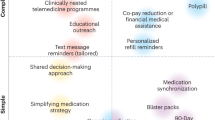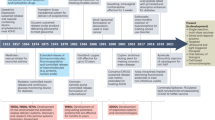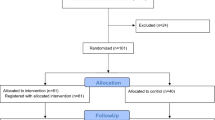Abstract
In patients with cardiovascular diseases, adherence to medication is a fundamental prerequisite for pharmacological therapy to be effective. Nonadherence to medication is a major public health problem that compromises the effectiveness of therapies and results in suboptimal clinical outcomes. The behaviour of nonadherence is complex and is strongly influenced by an interaction between various factors, such as patient education, communication between patients and physicians, drug dosing schedules, and access to health care. Interventions have been implemented to target these barriers to adherence; however, individual interventions have generally been associated with fairly modest improvements in adherence. Financial incentive schemes and modern technology, such as mobile telephone applications, are being harnessed as novel strategies to improve adherence. Ultimately, multifaceted strategies tailored to individual patients are likely to be required to improve long-term adherence to medication and consequently enhance patient health.
This is a preview of subscription content, access via your institution
Access options
Subscribe to this journal
Receive 12 print issues and online access
$209.00 per year
only $17.42 per issue
Buy this article
- Purchase on Springer Link
- Instant access to full article PDF
Prices may be subject to local taxes which are calculated during checkout
Similar content being viewed by others
References
Lozano, R. et al. Global and regional mortality from 235 causes of death for 20 age groups in 1990 and 2010: a systematic analysis for the Global Burden of Disease Study 2010. Lancet 380, 2095–2128 (2012).
Haynes, R. B. in Compliance in Health Care (eds Haynes, R. B., Taylor, D. W. & Sackett, D. L.) 46–62 (The Johns Hopkins University Press, 1979).
Rand, C. S. Measuring adherence with therapy for chronic disease: implications for the treatment of heterozygous familial hypercholesterolemia. Am. J. Cardiol. 72, 68D–74D (1993).
WHO. Adherence to long-term therapies: evidence for action [online], (2003).
Vrijens, B. et al. A new taxonomy for describing and defining adherence to medications. Brit. J. Clin. Pharmacol. 73, 691–705 (2012).
Benner, J. S. et al. Long-term persistence in use of statin therapy in elderly patients. JAMA 288, 455–461 (2002).
Monane, M. et al. Compliance with antihypertensive therapy among elderly Medicaid enrollees: the roles of age, gender, and race. Am. J. Public Health 86, 1805–1808 (1996).
Choudhry, N. K., Setoguchi, S., Levin, R., Winkelmayer, W. C. & Shrank, W. H. Trends in adherence to secondary prevention medications in elderly post-myocardial infarction patients. Pharmacoepidemiol. Drug Saf. 17, 1189–1196 (2008).
Choudhry, N. K. & Winkelmayer, W. C. Medication adherence after myocardial infarction: a long way left to go. J. Gen. Intern. Med. 23, 216–218 (2008).
Osterberg, L. & Blaschke, T. Adherence to medication. N. Engl. J. Med. 353, 487–497 (2005).
Marshall, I. J., Wolfe, C. D. & McKevitt, C. Lay perspectives on hypertension and drug adherence: systematic review of qualitative research. BMJ 344, e3953 (2012).
Viswanathan, M. et al. Interventions to improve adherence to self-administered medications for chronic diseases in the United States: a systematic review. Ann. Intern. Med. 157, 785–795 (2012).
Nielsen-Bohlman, L., Panzer, A. M. & Kindig, D. A. (eds) Health Literacy: a Prescription to End the Confusion (National Academies Press, 2004).
King, A. Poor health literacy: a 'hidden' risk factor. Nat. Rev. Cardiol. 7, 473–474 (2010).
Miller, W. R. Motivational interviewing: research, practice, and puzzles. Addict. Behav. 21, 835–842 (1996).
Lavoie, K. et al. The efficacy of brief motivational interviewing to improve medication adherence in poorly controlled, nonadherent asthmatics: results from a randomized controlled pilot study [abstract]. Chest 140, 915A (2011).
Ogedegbe, G. et al. A practice-based trial of motivational interviewing and adherence in hypertensive African Americans. Am. J. Hypertens. 21, 1137–1143 (2008).
Golin, C. E. et al. A 2-arm, randomized, controlled trial of a motivational interviewing-based intervention to improve adherence to antiretroviral therapy (ART) among patients failing or initiating ART. J. Acquir. Immune Defic. Syndr. 42, 42–51 (2006).
Derose, S. F. et al. Automated outreach to increase primary adherence to cholesterol-lowering medications. JAMA Intern. Med. 173, 38–43 (2013).
Fischer, M. A. et al. Trouble getting started: predictors of primary medication nonadherence. Am. J. Med. 124, 1081.e9–e22 (2011).
Choudhry, N. K. et al. Full coverage for preventative medications after myocardial infarction. N. Engl. J. Med. 365, 2088–2097 (2011).
Chernew, M. E., Rosen, A. B. & Fendrick, A. R. Value-based insurance design. Health Aff. (Millwood) 26, w195–w203 (2007).
The Holy Bible: International Standard Version. Romans 7:15 (Davidson Press, 2008).
Bobonich, C. & Destrée, P. Akrasia in Greek Philosophy: from Socrates to Plotinus (Brill, 2007).
DeFulio, A. & Silverman, K. The use of incentives to reinforce medication adherence. Prev. Med. 55 (Suppl.), S86–S94 (2012).
Volpp, K. G. et al. A test of financial incentives to improve warfarin adherence. BMC Health Serv. Res. 8, 272 (2008).
Kimmel, S. E. et al. Randomized trial of lottery-based incentives to improve warfarin adherence. Am. Heart J. 164, 268–274 (2012).
Volpp, K. G. et al. Financial incentive-based approaches for weight loss: a randomized trial. JAMA 300, 2631–2637 (2008).
John, L. K. et al. Financial incentives for extended weight loss: a randomized, controlled trial. J. Gen. Intern. Med. 26, 621–626 (2011).
Aetna News Hub. Aetna launches CarePass Developers Challenge with $100,000 in prizes for top apps encouraging medication compliance [online], (2012).
US Department of Health & Human Services. Health Data Initiative. HHS.gov/Open [online], (2010).
Aetna. Health data initiative by HHS [online], (2012).
Aetna. CarePass® platform and medication reminder developer challenge webinar [online], (2012).
US National Library of Medicine. ClinicalTrials.gov [online], (2013).
GoodRx. Stop paying too much for your prescriptions! [online], (2013).
Health 2.0. Aetna's CarePass platform and medication reminder developer challenge [online], (2012).
FDA. Mobile medical applications: guidance for industry and Food and Drug Administration staff [online], (2013).
Timimi, F. K. Medicine, morality and health care social media. BMC Medicine 10, 83 (2012).
Author information
Authors and Affiliations
Contributions
T. H. Tajouri and S. L. Driver researched data for the article. All the authors contributed substantially to discussion of its content and wrote the manuscript. T. H. Tajouri and D. R. Holmes Jr reviewed/edited the article before submission.
Corresponding author
Ethics declarations
Competing interests
The authors declare no competing financial interests.
Rights and permissions
About this article
Cite this article
Tajouri, T., Driver, S. & Holmes, D. 'Take as directed'—strategies to improve adherence to cardiac medication. Nat Rev Cardiol 11, 304–307 (2014). https://doi.org/10.1038/nrcardio.2013.208
Published:
Issue Date:
DOI: https://doi.org/10.1038/nrcardio.2013.208
This article is cited by
-
The American Society of Nuclear Cardiology Diversity, Equity, and Inclusion mission statement
Journal of Nuclear Cardiology (2023)



